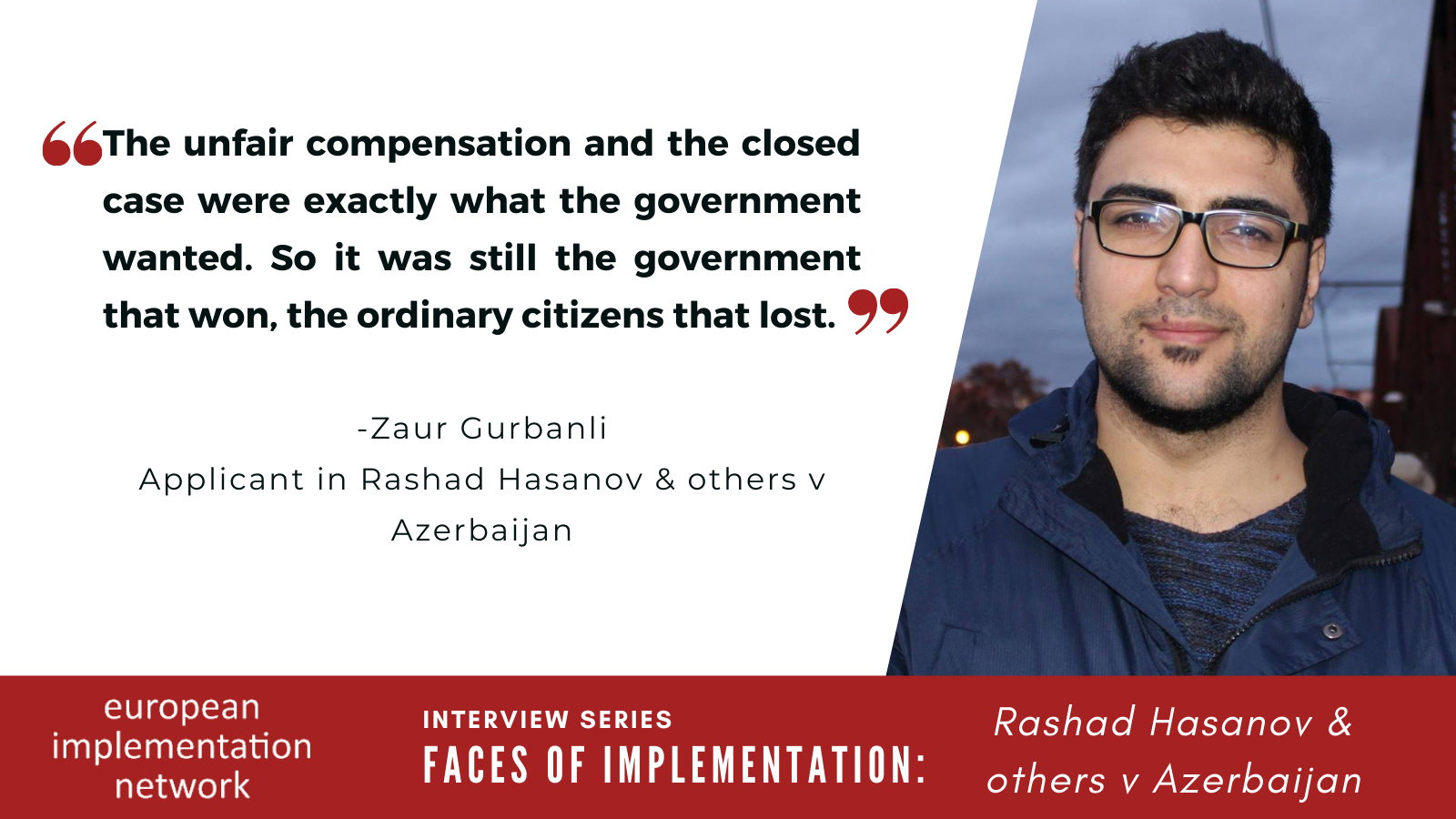The right to criticise your government is a fundamental right. When authorities crack down on dissent, it threatens the fabric of society and silences the opposition.
Today, Faces of Implementation dives into the Rashad Hasanov & others v Azerbaijan case, which concerns the misuse of criminal law against student activists in Azerbaijan.
We speak with Zaur Gurbanli, one of the Applicants in the Rashad Hasanov & others v Azerbaijan case. He shares his experiences living in Azerbaijan before and after his detention and the actions he took to start a new life outside his home country.
The Interview
Background
My name is Zaur Gurbanli. I am originally from Azerbaijan, where I was a lawyer, but now I live in the United States of America. About nine years ago, I was a part of the political process in Azerbaijan as an oppositional activist under the civic movement NIDA, an organisation that wants liberty, justice, truth and change in Azerbaijan through non-violent means. My colleagues and I were organising protest rallies and events against the government - in particular in protest against the death of soldiers in the Azerbaijani army in non-combat situations. After about two such events, the government wanted to stop us. In early March 2013, they started arresting NIDA members, including me and the other applicants in this case. They tortured us and continued to detain others. There was a criminal case against us, where we were sentenced to six to eight years in prison. Some of us carried out a year and a half to six years sentences.
When we brought our case to the European Court of Human Rights (ECtHR), the Court found that our arrest and detention were done in the absence of any reasonable suspicion of an offence, and also that the criminal proceedings were carried out with the purpose to silence and punish us for our social and political engagement. The ECtHR also ordered the government to pay compensation to us of around EUR 30,000. The government did pay us compensation, although it was in small installments.
After the ECtHR delivered the judgment in our case, we were looking for our full acquittals and for the restoration of our rights and freedoms as they were before our arrests. Many European institutions were advocating for our acquittal. Though the government did not agree with this, negotiations continued for many years until we finally got acquitted. However, the second part of our demands did not happen: our rights were not restored.
Engaging in the Implementation Process
EIN contacted us in 2020 and offered help with preparing our submissions. We started to do so, and it was a long process. EIN not only helped us draft the submissions but also planned when we should do so. It was very insightful. At times, we strategized to wait for the government submissions in the hope that they had good intentions, but never saw that.
We submitted several Rule 9 communications to the Committee of Ministers. I think they were decisive in achieving justice because they created pressure which led to our acquittal - and without them, we would have never achieved that. Luckily, there were a few other cases of political prisoners in Azerbaijan seeking acquittals; these cases helped ours, as they were all grouped together in the Mammadli group of cases, and examined regularly by the Committee.
However, there are other political prisoners in Azerbaijan who do not have ECtHR judgments in their favor and will not receive acquittals. But for us, submissions were decisive in the justice-seeking process, even if it was slow. We were charged in 2013 and acquitted in 2021; many years of our lives were marked by this injustice.
Positive Developments
Initially, we did not expect the government to acquit us. We just knew we would receive some form of payment, but the sums were not enough to cover the damage done to our lives. Only when Anar Mammadli was acquitted, in relation to his ECtHR case Mammadli and Others v. Azerbaijan, we thought it was possible for us too.
During the implementation process, the government wanted us to “benefit” from an expungement of our criminal records rather than an acquittal. This meant they believed we were criminals with completed convictions, rather than innocent persons, and that some of our rights should remain restricted. Instead, we called for an acquittal, which meant that we never were criminals, but that we were equal to regular citizens. We convinced the Committee that expungement of our criminal records was not a sufficient measure - and that acquittal was needed. I finally acquired my acquittal in November 2021, three months after I left the country.
We also tried to get the state to remove our convictions from the state registry. In Azerbaijani legislation, if you have a criminal conviction, some of your rights can be restricted at any time in your life. For example, you cannot run for political office, and you cannot adopt a child. We wanted to ensure that this restriction was removed as an obstacle - and that we had full restitution of our rights.
The fact that we received our acquittals from our Supreme Court, and not from a European institution or any other international court is a positive precedent in our view. It was an important step for our judicial system and the future of democracy in Azerbaijan. I do not know when this authoritarian regime will be overthrown and when the country will have democracy. But for me, the main positive development - for our future democratic government - is that we had this decision from our Supreme Court and that the state acknowledged their mistake regarding an ex-political prisoner. This will be a crucial precedent.
Main Challenges
A main challenge is that the process was - and still is - slow, and many people are unable to wait. For example, I was still waiting for my acquittal when my father passed away. It would have meant so much to him and me for him to see it. He passed away three months before I was acquitted.
Another challenge was that the true aim of the government was not to restore justice. They just tried to pressure us more. While they were writing to the Committee of Ministers, they were also pressuring us daily. There were days when the police were waiting for me outside my house; some days I did not leave my house because I was afraid of being detained. The government never stopped putting pressure on us, even when they were negotiating with European institutions. The government was not acting in good faith; that is why the process was slow: because they did not want to implement the judgment.
Finally, the treatment in society of ex-political prisoners is an important ongoing challenge. In 2012, after my first arrest, my workplace had fired me, and I could not find any work. The government prohibited companies from employing me - government, private organizations, and no one was allowed to employ me. I was unemployed for nine years. My parents were also experiencing health issues, so it was too much pressure on us. We then agreed that it would be best to leave the country. I left Azerbaijan in August 2021, and retrained professionally.
Azerbaijan needs to change its policies on ex-political prisoners and opposition activists. I was unemployed in my country for many years due to this injustice, but if I stayed, I would still be unemployed. People are afraid to hire political prisoners. Without this change, ex-political prisoners will never receive full restitution, and the consequences of their illegal arrests and convictions will continue to affect their lives because of such silent policies. In my view, full restitution is about the whole process, not about the particular steps.
Frustration
When we saw that the government was going to grant acquittals for other similar cases regarding political prisoners, we had hopes that we would also receive an acquittal soon. We requested acquittals through the Committee of Ministers process, but it did not happen for two years. I was frustrated that the authorities could ignore our request for so long, and that they could negotiate with European institutions and make deals in the meantime. We felt we were on the table during this negotiation process, like a bargaining chip. It was very frustrating. It felt like our future was not in our hands.
Azerbaijan did not punish those involved, like the prosecutor, the judges who prosecuted and convicted us, or the government officials who declared us criminals on state television. Even though we finally did receive our acquittal, it is only meaningful if you also have full restitution. Without the latter, the acquittal is just a piece of paper.
I managed my frustration during that time by looking for other avenues to carry on with my life. I could not wait for the government to grant me an acquittal to restore my old life and rights; that is when I decided to leave the country. The financial implications had caused a lot of stress and frustration.
Value of the Acquittal & Case Closure
Before the acquittal, we got in touch with the government and tried to explain the moral value of an acquittal which was a crucial individual measure for us. But they couldn’t understand it. The priority for the government was to reduce the amount of compensation awarded by the Baku Supreme Court, in comparison with previously acquitted political prisoners, and they could not fathom the moral value of an acquittal for the applicants.
With or without the acquittal, I knew I wasn’t a criminal. But it was vital for me to get the government to recognize our innocence and acknowledge their mistake. While I knew from the start that I wasn’t a criminal, it was important for the government to address this.
When the supervision of the case was closed, we did not receive any notification from the Committee of Ministers. The Committee took the Azerbaijani government’s word that they would pay us the compensation awarded by the Baku Supreme Court. The compensation awarded by the Baku Supreme Court was paid roughly seven months after the closure, and my conviction was also removed from the public registry after the case was closed. I do not believe it was right to close the case before the government took these measures.
Advice to Others
You need to fight to the end and not lose hope. Seek help from organizations like EIN that can help you along the way. In Azerbaijan, opposition activists often get arrested. Life after arrest becomes very difficult for them in Azerbaijan, and they usually have to stop their political actions and leave the country. But there are people that can help you.
For ex-political prisoners: do not wait for things to change. When I was released from detention in 2012, I stayed in the country until 2021, waiting for things to change. Don’t wait for your life to go back to normal. Take steps now that will better your future.
Relevant information Rashad Hasanov and others v. Azerbaijan
Final Resolution - Case Closed
CASE OF RASHAD HASANOV AND OTHERS AGAINST AZERBAIJAN [CM/ResDH(2021)426]
Applicant Communications







